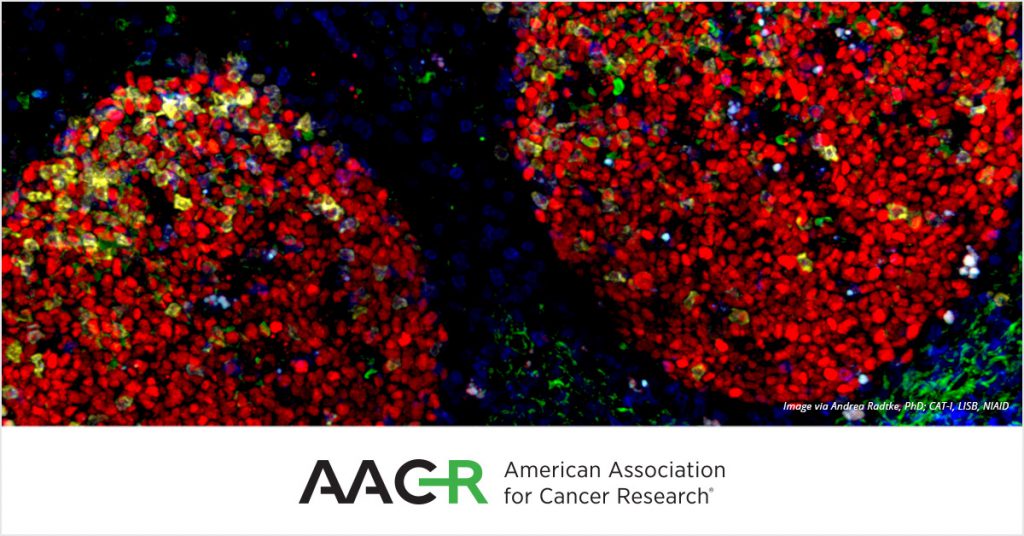NIH-AACR Conference Explores Intersection of Cancer, Autoimmunity, and Immunology
By Elizabeth KS Barksdale, PhD
Since the U.S. Food and Drug Administration (FDA) approved the first immune checkpoint inhibitor in 2011, the cancer immunotherapy field has grown quickly. Currently, there are seven FDA-approved checkpoint inhibitors for an ever-increasing number of indications, and countless clinical trials underway assessing combinations of checkpoint inhibitors with other immune and cancer therapeutics.
Although checkpoint inhibitors and other immunotherapies are remarkably effective for patients with some cancers, demonstrating durable antitumor activity and/or high response rates, they are not risk–free. Reports of immune-related adverse events (therapy-dependent toxicities caused by non-specific activation of the immune system) surfaced early in development for ipilimumab and accompany all approved immunotherapies.
The American Association for Cancer Research (AACR) will join the National Cancer Institute (NCI), National Institute of Allergy and Infectious Diseases, and National Institute of Arthritis and Musculoskeletal and Skin Diseases to convene the NIH-AACR Cancer, Autoimmunity, and Immunology Conference on April 15-16, 2019, in the Masur Auditorium on the National Institutes of Health campus in Bethesda, Maryland.
“We saw the need for an interdisciplinary conference to discuss adverse events resulting from the treatment of cancers with immunotherapies and to work toward consensus on their assessment and management,” said conference cochair Elad Sharon, MD, senior investigator at the NCI. “We wanted to bring cancer researchers together with rheumatologists, immunologists, infectious disease experts, and others to identify areas of scientific opportunity.”
“The AACR is excited to partner with the NIH for this important conference,” says conference cochair Elizabeth M. Jaffee, MD, AACR immediate past president and Deputy Director of the Sidney Kimmel Comprehensive Cancer Center. “Immuno-oncology revolutionized the treatment and management of many types of cancer and brought new hope to patients. Improving our understanding of the biological underpinnings of immune-related adverse events through open discussion in forums such as the Cancer, Autoimmunity, and Immunology Conference will further the AACR’s mission to help patients.”
“Our approach for this conference is to take a system-by-system view of current challenges and opportunities for predicting, treating, and understanding immune-related adverse events” said cochair Howard Young, PhD, senior investigator at the NCI.
The conference will feature sessions on gastrointestinal, neurological, and skin toxicities. Attendees will hear keynote presentations from Arlene H. Sharpe, MD, PhD, of Harvard Medical School, on T-cell co-stimulation in autoimmune diseases and cancer; Jaffee, who will discuss immuno-oncology combination clinical trials; and Jennifer A. Wargo, MD, MMSc, of MD Anderson Cancer Center, on the link between the gut microbiome and immunotherapy response.
“Non-clinical models are critically important to understand these adverse events and treat the side effects associated with immuno-therapeutics,” explained conference cochair Connie Sommers, PhD, program director at the NCI. “Whether genetic engineering or xenograft, we need models that will help us understand the entire spectrum of effects we see with immunotherapy.” Jeffrey A. Bluestone, PhD, 2019 recipient of the AACR-Irving Weinstein Foundation Distinguished Lectureship, will contribute to this conversation by presenting in the session on non-clinical models moderated by John Leighton, PhD, and Julie Schneider, PhD, from the FDA.
Registration for the conference is free and still available for in-person attendance or webcast. Continuing Medical Education credits are available for those who attend in-person. In addition, there will be a poster session and networking reception at the conclusion of the presentations on Monday, April 15.






